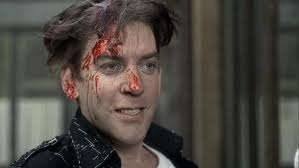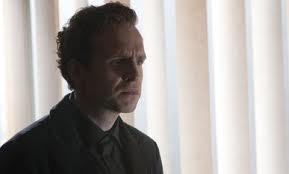Don't touch that donkey
[image error]
Mark Cousins' glorious Story Of Film on More4 continues to delight on a weekly basis, and, after this week's chapter about Bergman, Bresson, Tati and Fellini, I have even more films on a list of must-sees. I was particularly taken by Robert Bresson's Balthazar (or Au hazard Balthazar), which I have never seen; made in 1966, it apparently tells the tale of a donkey through his various owners, who, Cousins said, mistreat him. The moment a black-and-white clip came onscreen, I started to feel uncomfortable. Were they about to show a clip of a donkey being mistreated? If so, it being a French film made in 1966, there seemed to be every chance that actual cruelty might be involved. Fortunately, this was not the case. In fact, Cousins merely showed a fixed shot of Balthazar, looking noble, which was his point about Bresson. But will the film itself upset me? It seems a possibility. I have the celebrated new Greek film Dogtooth sitting there in my Sky+ tank, but I know it has something about cruelty to cats in it – a boy seems to be going after one with some garden shears in the trailer – so I haven't dared watch it yet.
The older I get, the less tolerant I become about animal cruelty. And by animal cruelty, I don't just mean actual animal cruelty – you know, those disgusting stories you read in the papers about kids putting pets in tumble driers, or animals being left to fend for themselves by neglectful owners in sheds or bedrooms, or even, that deranged woman who put a cat in a wheelie bin and walked away – I mean implied animal cruelty in fiction. Of late, I have seen two dogs being subject to implied violence and cruelty in Tyrannosaur, and what looked to me like actual cruelty towards two dogs in the forthcoming Wuthering Heights by Andrea Arnold. (Having mentioned the latter, someone from the film's distributor Artificial Eye reassured me that animal trainers were on set. I don't doubt this. But having seen the film, this did not reassure me, unless both scenes were done with CGI, which I doubt.)
I'm well aware that we live in enlightened times with regards the treatment of animals on films sets. And certainly in Tyrannosaur, the two dogs are not harmed on camera. One is pulled about on a dog lead, but this is as far as it goes; the other is also restrained on a lead while it barks madly at someone. I have no doubt that both dogs are handled by trainers who love them and respect them, and I understand it's very difficult to train a dog with anything other than love and rewards, so it might be said that dog actors are likely to be even better treated than dog non-actors. So we're going to put this one down to my own over-sensitivity on the issue. The two dogs in Wuthering Heights, who must, again, be loved by their handlers, looked to my eyes to be at least made uncomfortable for a few seconds of screen time each. If you've read the book, this happens on the page, and is significant in describing the nature of a human character. However, I don't believe we need to see animals squirm to make a dramatic point. (If anyone else has seen this film, I'd be interested to hear how you felt about it. It's released on 11 November, and has much to recommend it, artistically. I'll review it nearer the date.)
I realise to see Tyrannosaur, a film about horrific domestic abuse meted out to human beings, and be affected so deeply by abuse meted out to pets, I am falling into the cliche of an animal lover. I can't help that. Human actors choose to act in films. Animals do not. In this country, I think I'm right in saying that a film cannot be certificated if it is not passed by animal cruelty organisations. That's as it should be. (Is it voluntary to be passed by the Humane Society in the United States? I think it is.) Again, I think I'm right in saying that laws are more lax in other territories. Remember the video nasty era, and the mythology surrounding "snuff" films? Well, I understand animals are dismembered and killed in films like Cannibal Holocaust (again, how ironic – films about eating humans do not harm humans, but do harm animals). I haven't seen those films. I don't wish to. I'm pretty squeamish about screen violence, but it won't stop me seeing a film – hey, Drive, Kill List, Tyrannosaur, I'm seeing brutally violent films on a regular basis at the moment, and on TV the likes of Boardwalk Empire and forthcoming French import Braquo are pretty damned violent, too. But I'll never get used to cruelty towards animals.

Techniques like tripwires to trip up horses used to be commonplace. S0 when I see some of my favourite classic westerns, I know I am watching animal cruelty. In Apocalypse Now, perhaps my favourite film of all time, an ox is ritually slaughtered before our very eyes, in slow motion, the descending machetes hacking its flesh shown repeatedly. I can't say I enjoy it, but it's in the past. Heaven's Gate had a high body count, too, apparently. I loved Bernardo Bertolucci's 1900, a sometimes overblown Euro-pudding epic about fascism, but in one scene we are invited to understand the cruelty of one character, played by Donald Sutherland, by watching him hang a cat by its collar on a hook on a wall and headbutt it to death. Clearly, Sutherland doesn't actually kill the cat with his head, but – and here we go again – it is seen squirming on that hook, clearly distressed and confused. I have to look away, or fast forward. I can't bear to watch it. As a huge fan of European cinema of the 50s, 60s and 70s, I am always on guard for such moments, when animal life is declared cheap.

And then there's The Shadow Line, Hugo Blick's phenomenal highbrow police drama from earlier this year. In one now infamous scene, Rafe Spall's sadistic villain proves his sadism by threatening to drown a cat. He appears to dunk a real cat in a barrel of water. In real life, he doesn't. It's very cleverly staged. But, in real life, a wet cat runs away from the scene. To even make a cat wet is, to my mind, cruel. Cats hate being wet. Flicking a few drops of water on a cat makes it uncomfortable. So I was against this scene. Also, and here's a grey area, there are a lot of stupid people out there. For most sensible people with the basic degree of empathy for God's creatures, seeing a woman put a cat in a bin would remind you never to put one in a bin. For a tiny minority, it might give them an idea. (We live in a YouTube world, where people will it seems do anything to get themselves noticed, whether that's putting themselves in danger, or a mouse.)
This post is not really about animal cruelty. For the majority of us, it's a given that harming an animal for no good reason is wrong. (In one of the incidents in Tyrannosaur, the character is harming the dog because it has harmed another character; I don't agree with it, but you could argue self defence in a court of law, if it was human against human.) Also, there are those who lead a vegan lifestyle, which does not include me, and that kind of respect for animals is near-religious and about as admirable as any lifestyle choice can be. I allow animals to be killed so that I can eat them, but I choose to spend more money on meat in order than it comes from animals that were not raised in cages or cramped barns without sunlight, and were not pumped full of drugs in order to speed up their lives. That's as much as any carnivore can do.
What worries me is that animal cruelty, the implied kind, seems to be creeping back into the fictional mainstream. The Shadow Line was not making a point about animal cruelty, it was making a point about a character. Wuthering Heights is not making a point about animal cruelty, it is making a point about a character. In many ways, these fictions are respectful to animals; they are saying, this character is such a villain he will harm a cat or a dog – imagine what he might do to a human! But that doesn't help me out. I suspect that as I get even older, I will become even more of a sentimental sop on this issue.
When I was a kid, I was taken to the circus on more than one occasion. And to zoos. I loved them. It took me a long time to change my attitude towards the captivity and exploitation of animals. But once I had turned that moral corner, I could never go back. Circuses no longer use animals as performers. Zoos are all about conservation. Life for animals has improved immeasurably. So let's stop putting them on the stage, Mrs Worthington.
[image error]


 [image error]
[image error]



Andrew Collins's Blog
- Andrew Collins's profile
- 8 followers



